Dentures Cottonwood Heights
The Tried-and-True Solution to Tooth Loss
Dentures, which are used to restore smiles by replacing missing teeth, have been around for centuries. Fortunately, today, they’re made with natural-looking, customized materials that not only look realistic but also allow them to function better, making everyday tasks like eating and speaking easier. At White Peak Dental, our friendly team is happy to start your smile restoration journey with you by scheduling your initial consultation for dentures in Cottonwood Heights!
Why Choose White Peak Dental for Dentures?
- Dentist with Advanced, Specialized Training
- Family-Friendly Dental Practice
- Affordable In-House Membership Plan
Who is a Good Candidate for Dentures?

Dentures are more versatile than many people think, with the ability to restore several missing teeth scattered throughout an arch or a whole row of missing teeth. During your initial consultation, Dr. Hansen will examine your mouth and speak with you about all of your options to help you determine the best one to fit your lifestyle and needs. We recommend that missing teeth be replaced in a timely manner to avoid additional oral health problems down the road, like gum disease and decay.
Types of Dentures
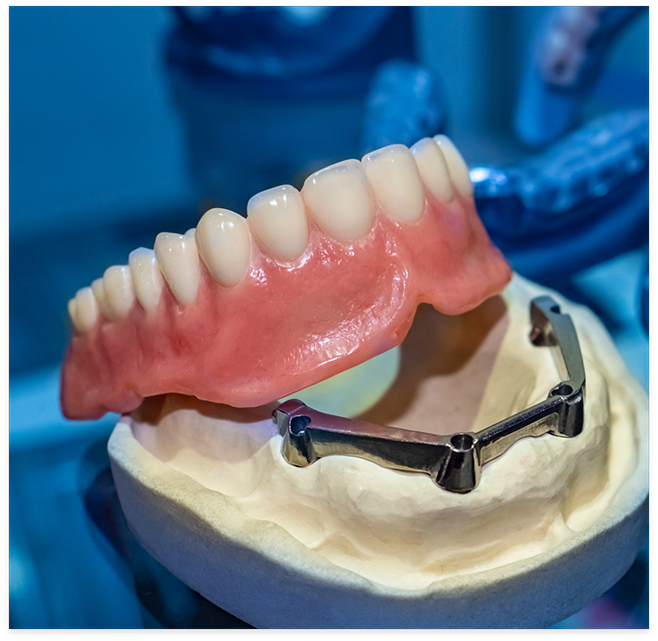
Based on your unique tooth loss situation, our team may suggest any one of the following types of dentures to help restore the function and appearance of your smile. We’ll discuss all of the pros and cons of your options and outline a cost estimate for you as well at your initial consultation.
Partial Dentures
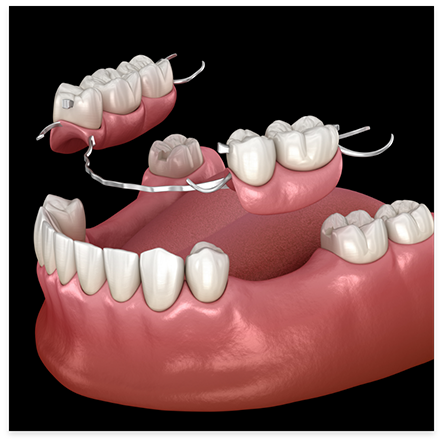
Partial dentures are crafted from a gum-colored acrylic base that’s often supported by metal. The base is designed to fit around your existing teeth, anchoring the replacements in place to fill gaps spread throughout your arch. Partials are conveniently removable, making them easy to clean.
Full Dentures
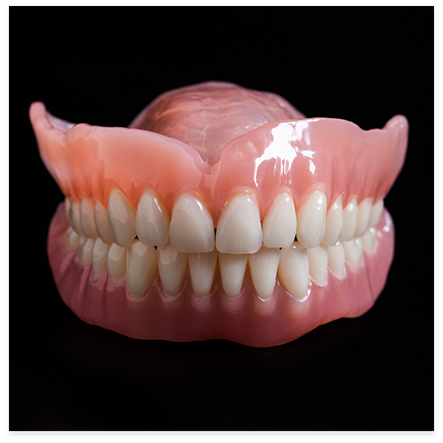
Traditional full dentures are designed to restore an entire arch of teeth by anchoring to the jawbone and gums via suction. They feature a lifelike, gum-colored acrylic base along with porcelain or ceramic prosthetic teeth that can improve your bite power and overall quality of life dramatically.
Implant Dentures
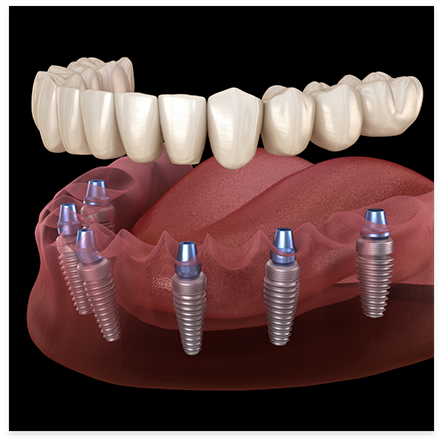
Implant dentures take the lifelike aesthetic benefits of traditional prosthetics and merge them with modern technology. Using small titanium posts that are surgically placed below the gumline to restore the missing root structure of teeth, we can secure restorations in your mouth that are strong, unwavering, and function and look like natural pearly whites.
Temporary Acrylic Removable Partial Denture
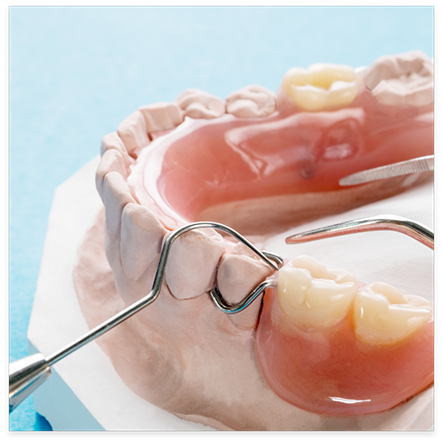
Known as the “flipper” in dentistry, this is generally the least expensive option for replacing missing teeth. Some flippers have a wire clasp to help attach the acrylic base to the teeth while others have no clasps at all. These removable partial dentures have an acrylic base just like a complete denture. The biggest benefit of this type of removable partial denture is that it can be made before any teeth are removed and delivered the same day when extractions are done. Then, if more teeth need to be removed later, teeth can be added easily and economically to the flipper.
Cast Framework Partial Dentures
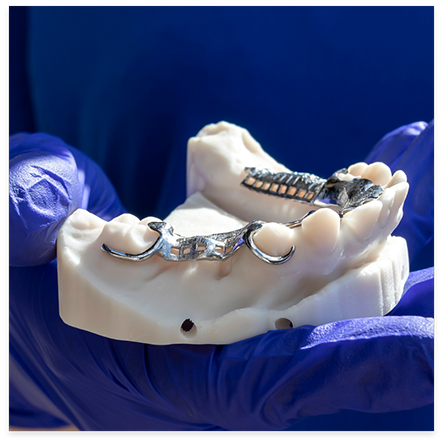
As the name implies, these are partial dentures that have a cast metal framework supporting the acrylic and teeth. These partials are mainly tooth-supported and are therefore extremely stable. The metal framework is cast extremely thin and is much less noticeable than the acrylic framework of partials.
The clasps are designed to retain the partial in place, and the teeth are altered slightly to allow the patient to bring teeth all the way together without interfering with the clasps. This also makes it possible to place the clasps in positions that are less visible than wire clasps.
The cast framework is also very strong and less likely to break than acrylic, and since the metal does not rest on tissue, but on teeth, these partials do not sink below the level of the teeth. Finally, since there is little contact with the soft tissue, sore spots are not much of a problem.
Flexible Framework Partial Dentures
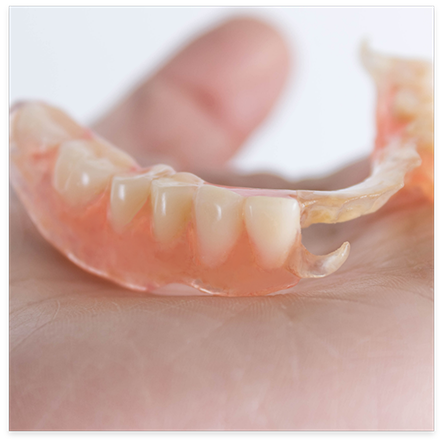
The newest types of partial dentures are made from a nylon-like material and are called Valplast (the most common) or Flexite partials. This material replaces the metal and acrylic of a standard partial denture. The clasps that hold the partial to the teeth are made of the same pink material and are generally indistinguishable from the gums, a very nice aesthetic benefit. The material is also nearly unbreakable, so it can be made quite thin, a distinct advantage over acrylic framework partials.
Combination Metal Framework with Flexible Clasp Partials
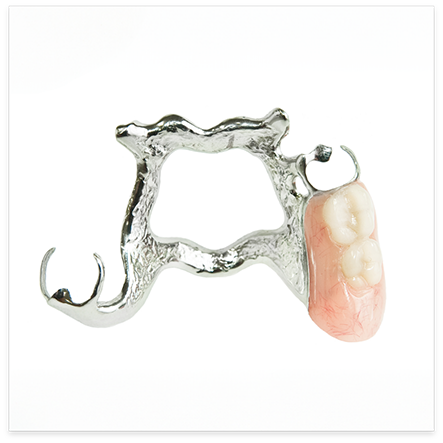
For the patient with high esthetic demands who also need the most stable framework possible, we are now able to make a metal framework with clasps made of the pink material used in Valplast or Flexite partials. This allows us to hide the clasps while alleviating many of the sore spot problems associated with flexible frameworks.
White Peak Dental and Dr. Hansen will spend time consulting with you on which removable partial denture is best for you.
The Benefits of Dentures

There are countless benefits that you can enjoy when you decide on dentures with your dentist in Cottonwood Heights. Some of the advantages you’ll be able to reap include:
- Effective bite restoration
- Ability to eat more foods
- Better speaking ability
- Prosthetics that can last 7+ years with good maintenance
- Easy-to-maintain prosthetics
- Preservation of facial shape
If you’d like to learn more about dentures and what they can do to change your life, give our team a call today!
Understanding the Cost of Dentures
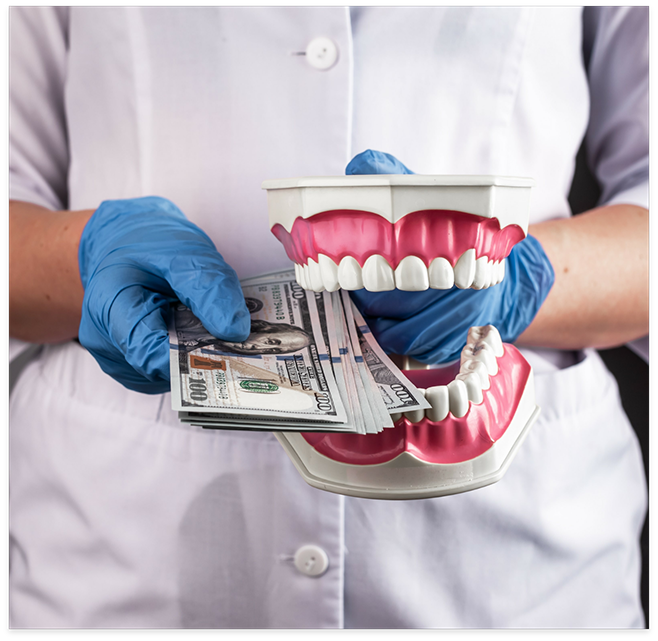
Are you unsure of what to expect from the cost of dentures in Cottonwood Heights? Our team at White Peak Dental believes you should be able to restore your smile without stressing over the financial pressure that it typically entails, which is why we’re happy to offer several different payment methods and discounts through our in-house membership plan. Take advantage of restoring your smile with a trustworthy, skilled dental team today by scheduling a consultation to get a detailed cost estimate for dentures.
Factors That Can Affect the Cost of Dentures

There’s no set cost of dentures because there are multiple factors that play into determining the price of treatment. Some of these include:
- How many teeth you’re missing
- Whether you require preparatory procedures like tooth extractions
- If you decide to receive dental implants
- What materials your dentures are crafted from
We’ll discuss each of these details with you during your initial consultation, along with how they can impact the overall cost of your treatment.
Are Implant Dentures More Expensive?
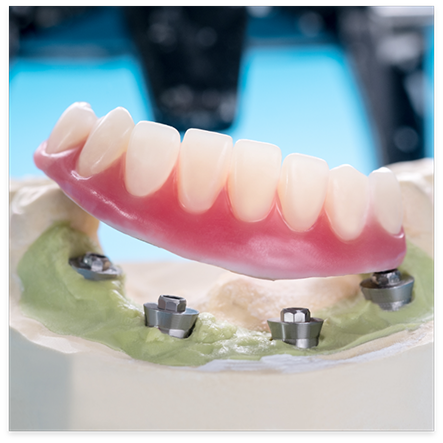
While it’s true that implant dentures have a higher up-front cost, they also offer an array of unique, priceless benefits that make them one of the most popular solutions for tooth loss among patients. One of these is that they have a lifespan of up to 35 years. This means that they can last over three times longer than traditional dentures, making them a more cost-effective solution in the long run.
The best way to learn whether implant dentures in Cottonwood Heights are right for you is to schedule a consultation with Dr. Hanson. He’ll let you know if you’re a good candidate for the procedure and outline the cost with you so you can see whether it would be the better investment for your oral health and overall quality of life.
Does Dental Insurance Cover Dentures?
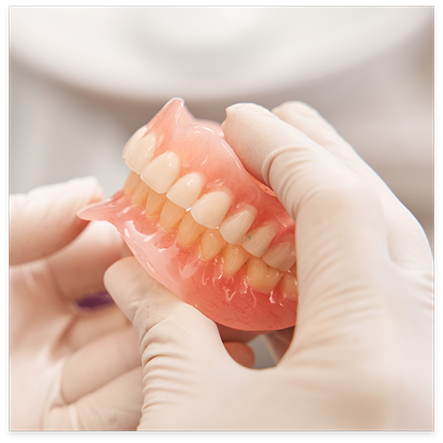
Typically, dental insurance plans do cover a portion of the cost of dentures. However, it’s worthwhile to note that every plan is different and to find out, you’ll need to contact your provider directly to ask. Our team at White Peak Dental is happy to be in-network with most major PPO dental insurance plans, and if we aren’t in-network with yours, know that we’ll be happy to file a claim on your behalf to help you maximize your benefits.
Ways to Make Dentures More Affordable

In addition to accepting most dental insurance plans, we’re proud to make dentures from your dentist in Cottonwood Heights more affordable by offering a 30 percent discount through our in-house membership plan. At only $220 a year, this plan includes two basic cleanings and full exams, an oral cancer screening, all digital X-rays, and an emergency exam with X-rays every year, along with the discount mentioned above. It’s a great deal that eliminates the stress of taking care of your smile!
Dentures FAQs
Should I Have All My Teeth Pulled to Get Dentures?
You don’t need to have your teeth pulled to get dentures. In fact, it’s actually better if you don’t.
The truth is that repairing a damaged tooth is always preferable. Pulling one, you see, can lead to long-term complications. As such, tooth extractions should only serve as a last resort for serious problems — things like extensive decay, severe infections, or dental trauma.
Still, tooth extraction for dentures can be helpful. For example, replacing an entire arch of decayed or infected teeth may be more cost-effective than dental crowns. Therefore, your dentist will explore all your options — tooth-pulling included — at the consultation.
Is It Hard to Talk with Dentures?
Admittedly, it’s often hard to speak with dentures at first. Fortunately, though, this effect is temporary and fades as you adjust to your new teeth.
As for how long it takes to talk with dentures comfortably, the timing varies from person to person. Still, you can expect that things will go more smoothly the more you practice. Therefore, consider trying the methods below:
- Read out loud to yourself, all the while repeating difficult-to-pronounce words.
- Speak more slowly when possible. Fast speech may come out muffled if you’re not used to dentures.
- Bite down and swallow before you talk so your false teeth are in the right position.
- Use denture adhesive to give your new teeth extra stability.
Why Do My Dentures Smell?
Dentures sometimes smell due to trapping food and bacteria in their nooks and crannies. Such elements can cause sores and infections, both of which contribute to bad breath. Given these facts, then, it’s a good idea to avoid a smelly mouth by cleaning your dentures. In particular, brush them daily with a specialized cleaner. You should also soak the dentures every night in a disinfecting solution.
Can Dentures Reduce Life Expectancy?
Unfortunately, dentures really can reduce life expectancy. Research even shows that wearing them could cut it by up to 10 years.
The source of the issue is dentures’ impact on meals. A low bite force can make certain foods hard to chew, so some denture wearers avoid healthy items and suffer from malnutrition. The result is that a patient may eat fewer apples, pears, carrots, nuts, and more.
Fortunately, implant-retained dentures could help with this issue. This kind has implants that fuse with the jawbone, thus restoring more of a patient’s bite strength. By doing so, they allow you to maintain a more varied diet.
